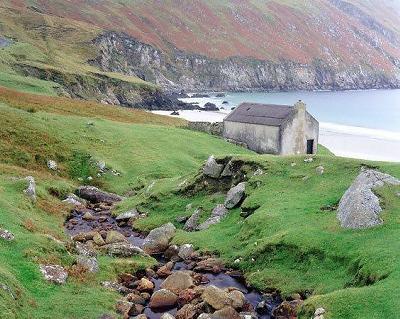Share This:
January 31, 2011 | Theatre,
A Tug-of-War Between Two Cultures
by Alyssa Mulligan
 Ireland may be comparatively small in size, but the amount of well-known literary authors from the island nation is immense, ranging from Oscar Wilde and Bernard Shaw to James Joyce and Samuel Beckett, just to name a few. And considering the country’s plethora of hardships over the years (Potato Famine and the Northern Troubles, anyone?), the hard-fought battle for the recognition of Irish literature has truly been an accomplishment. The most challenging obstacle was the decline of Ireland’s national language, adding to the ever-present “tug-of-war” of Ireland’s greatest writers between the Emerald Isle and England.
Ireland may be comparatively small in size, but the amount of well-known literary authors from the island nation is immense, ranging from Oscar Wilde and Bernard Shaw to James Joyce and Samuel Beckett, just to name a few. And considering the country’s plethora of hardships over the years (Potato Famine and the Northern Troubles, anyone?), the hard-fought battle for the recognition of Irish literature has truly been an accomplishment. The most challenging obstacle was the decline of Ireland’s national language, adding to the ever-present “tug-of-war” of Ireland’s greatest writers between the Emerald Isle and England.
Prior to the sixth century, Irish literature had a solely oral tradition. Even after legends and poetry began to be written down, stories of Irish culture continued to be primarily oral tales. It was this language of musicality and  lilt that provided a cultural cohesion for the people of Ireland. Unfortunately, this oral tradition went head-to-head with England’s literary medium, which contributed to the Anglo-Irish duality. After 1600, there was a drastic decline in the Irish language. Since landowners were English speaking, those who were fiscally interested elected to disregard the Irish language. This in turn degraded both the status of the Irish people and of their national dialect.
lilt that provided a cultural cohesion for the people of Ireland. Unfortunately, this oral tradition went head-to-head with England’s literary medium, which contributed to the Anglo-Irish duality. After 1600, there was a drastic decline in the Irish language. Since landowners were English speaking, those who were fiscally interested elected to disregard the Irish language. This in turn degraded both the status of the Irish people and of their national dialect.




Leave a Reply